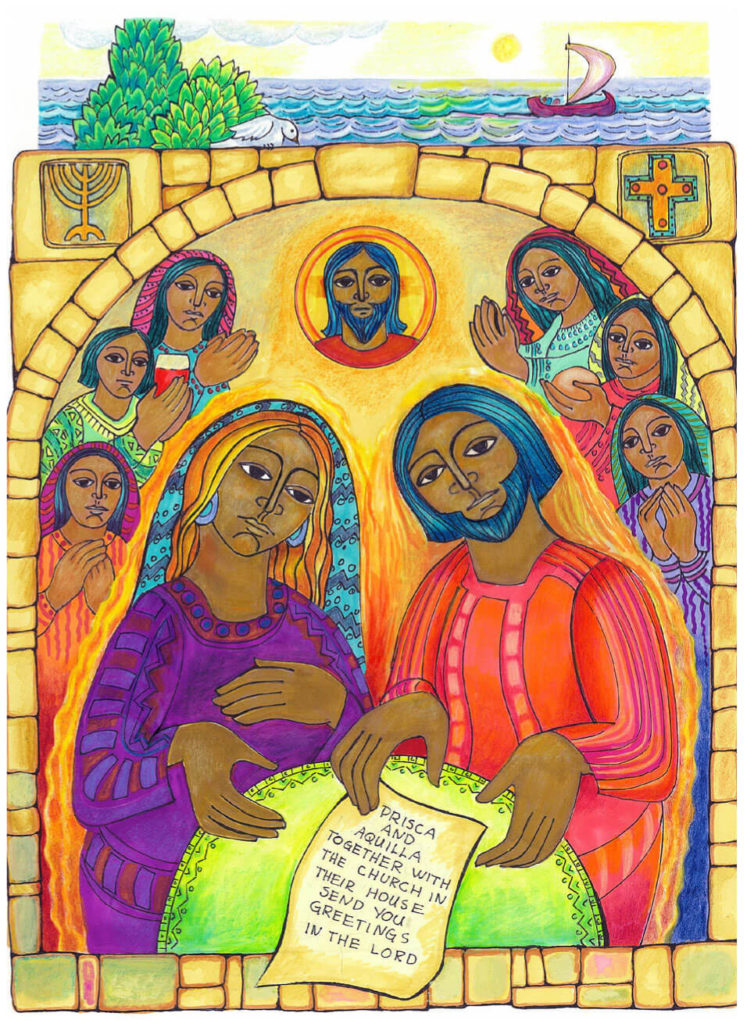Every time we pray the Our Father, Christians pray that God’s kingdom will come. In Sunday’s gospel Jesus sends out 72 missionaries to announce that the kingdom of God is at hand. A missionary is one who is sent to bring a message. The word to send in Greek is apostlein, from which we get the word apostle, missionary.
Jesus sends the 72 to bring God’s kingdom to the people they meet, to bring them peace and healing in his stead. Their work is to spread the same message Luke has angels bring to the shepherds at Jesus’ birth: “Glory to God in the highest, and on earth peace among those God favors” (2.14).
The 72 are the third wave of workers to take up the harvest in Luke, a harvest that is rich and ready. The 12 whom Jesus sends into the villages of Galilee to preach, heal, and cast out demons are the first wave of missionaries. They continue and extend Jesus’ own mission of bringing the kingdom near (9.1-2).
The messengers Jesus sends ahead of him into Samaria in last Sunday’s gospel are a second wave of missionaries. Luke calls them messengers although their explicit task is procuring lodging. In refusing to welcome Jesus as a guest, the Samaritans refuse to believe in him as well.
In this section of Luke, Jesus’ mission and the mission of the early Church overlap like a double exposure in story form. In one exposure we see Jesus leading his disciples to Jerusalem, where he will suffer and die. For Luke this journey is Jesus’ exodus, his baptism, and his lifting up. He is going on from Jerusalem to God.
Double-exposed upon Luke’s picture of Jesus’ journey is the beginning of the Church’s mission to bring God’s healing nearness to the people of the world. The three waves of missionaries belong to this mission.
Only Luke describes Jesus sending out 72 missionaries in pairs. Only Luke finds the story of the Church inseparable from the story of Jesus’ ministry and elaborates a second, companion volume to the gospel, his Acts of the Apostles. With the sending out of three waves of missionaries, Luke’s gospel turns to the people of the nations and anticipates a future that includes us who read the gospel 2,000 years later.
- Who brought the good news of God’s nearness to you? To whom have you handed it on?

Jesus asks of new disciples the same radical, itinerant way of life he models on the way to Jerusalem. His followers will have no place to lay their heads, no duties more important than preaching the gospel and bringing its healing power among the people, and no family ties deeper than the faith that unifies those who believe in Jesus and do God’s will.
Jesus advises no walking staff, no traveling bag, no sandals, no visiting along the way. A disciple cannot possess much less than this. Any who imitate Jesus’ lifestyle to this extent make a wholehearted commitment to preaching the gospel.
However, Jesus’ rules presume local communities of Christians that welcome the radical, itinerant missionaries. The greeting “Peace to this house” is the test. Missionaries stay with anyone who reciprocates this greeting. Jesus requires that homeless missionaries, who depend for their daily bread on Christians with homes, eat and drink what their hosts provide.
In Acts, Luke describes such a community in Jerusalem, one whose members share common meals and property. The Christians in Antioch also form such a local community. Antioch is where Paul lived for three years after his conversion.
Christian tradition remembers other homes as important, too, For example, Peter’s mother-in-law welcomes Jesus and his disciples to her home in Capernaum. Martha welcomes Jesus to her home. Perhaps Christian tradition remembers in these homes and the women who offer table service there other local communities of Christians or house churches.
Some Christian missionaries may have abused the hospitality of local families. Jesus’ rules admonish apostles to stay in one house and eat what is set before them, not to move to homes with more to eat or better rooms.
Jesus insists firmly that laborers deserve pay. In return for preaching the gospel and healing the sick, the missionaries receive food, lodging, and perhaps clothes. They roam but they do not freelance. They labor in the same great harvest Jesus began.
- What traditions of hospitality does your family extend to missionaries who bring others God’s word?
- How have you benefited from knowing and hearing missionaries?

Luke notes that Jesus sends the 72 out in pairs. This detail raises the question of whether the pairs were couples, men and women dedicated to spreading the kingdom. Jesus’ disciples include both men and women. The apostle Paul meets a married couple in Corinth named Aquila and Priscilla (Acts 18.1-4). Like Paul, they are tentmakers. Paul lives with them. On the Sabbath Paul leads discussions in the synagogue. Priscilla and Aquila accompany Paul to Ephesus and settle there. We see they are apostles in Acts 18.26, when they take aside a new missionary and instruct him in Jesus’ way.
In describing the three waves of missionaries who set out to continue Jesus’ work, Luke makes clear that they bring to the nations real peace. They herald Jesus. Jesus, not Caesar Augustus, is the true savior of the world, the benefactor of humankind, and giver of peace.
- What relationship do you have personally or as a parish with the Church’s worldwide mission?
- What relationships might you benefit from building?
